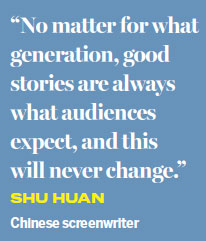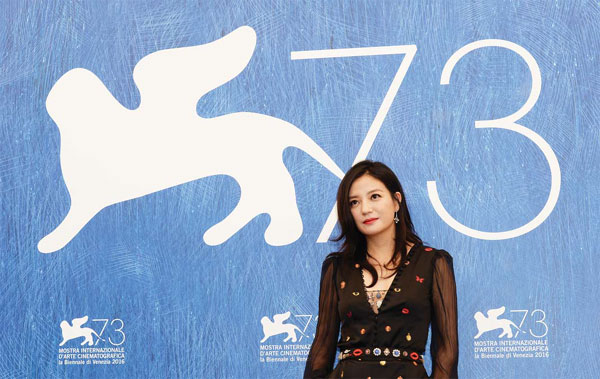Bridging the Dragon
Updated: 2016-09-09 07:46
By Mariella Radaelli(China Daily Europe)
|
|||||||||
With the Venice International Film Festival underway, European filmmakers increasingly look to collaboration with Chinese peers
With China on track to overtake the US as the biggest movie market next year, European filmmakers are increasingly working with Chinese partners.
The 73rd Venice International Film Festival, which runs until Sept 10, featured a rich edition of the China Film Forum on Sept 2, a collateral event that opened with a Sino-European content lab.
|
Zhao Wei, famous Chinese director and actress, presents the 73rd Venice International Film Festival. Mariella Radaelli / For China Daily |
Twelve projects in the forum from China and Europe benefited from tutors, including writers Yuan Yuan and Shu Huan, one of China's most in-demand screenwriters and author of the blockbuster hits Lost in Thailand and Lost in Hong Kong.
Shu is working on the script for My Best Friend Andersen, the first China-Denmark production, based on the works of 19th-century writer Hans Christian Andersen. The project, a fantasy romcom primarily targeted at Chinese audiences, is backed by Zentropa China.
Yuan is the screenwriter of last year's successful Goodbye Mr Tumor, China's entry for the Academy Awards.
The China Film Forum was organized by Bridging the Dragon, an international association that connects European and Chinese film professionals.
"Our main focus is bringing companies and professionals together to know each other, build trust and trigger collaboration," says Cristiano Bortone, an Italian film director, screenwriter, producer and a founder of Bridging the Dragon.
The association also hosted a full-day workshop at the forum to coach international professionals on how to approach the Chinese market.
"It's a great opportunity to discuss, confront each other, meet people and hopefully start new and exciting collaborations," says Bortone, who presented Coffee, the first Italy-China production, on Sept 3. The cast includes Sarah Yimo Li.

"The Chinese movie industry is soon going to be the biggest in the world," he says. "Up to now, most Chinese professionals were mostly attracted to Hollywood. But we know that Europe also has incredible richness in stories, locations, film professionals, financial resources and the most prestigious film festivals in the world. We believe the Chinese market, in its great need of content, can make use of all of this and at the same time European companies can enter China's potentially enormous market.
"We're content makers, we don't make purely industrial products. We create emotions - whatever they are - and emotions need to have a strong element of innovation, surprise and creativity. The audience pays for a ticket to see something new they have never seen before."
Storytelling is extremely important, he adds, as good stories have the most potential to break vital new ground.
This is a view shared by screenwriter Shu, who says: "We Chinese are improving our creative ability and becoming more globalized. I'm making an effort in this."
He says the Chinese film market is booming, but "there are hidden risks" such as the lack of high-quality scripts.
"With the expansion of the market and more funding, most Chinese professionals want to make more money immediately. So there are a number of things that violate the process of creation. The common problem is that they neglect the script. This is not the correct way to make films in the long term and is harmful to the Chinese film market."
However, Shu believes that "the marketization of Chinese films is mature, and films that violate the creative process will be eliminated".
"No matter for what generation, good stories are always what audiences expect, and this will never change," he adds.
Bortone agrees that Chinese audiences are becoming more refined. "I'm convinced that quality films will grow big-time in China in the next few years".
Ivy Zhong, head of Jetavana Entertainment, a company that is helping to finance My Best Friend Andersen, says China's film industry has "extreme potential" thanks to its attractive concepts and creativity and excellent professionals.
Reflecting on the trend toward internationalism and co-production, she adds: "I'm holding several projects that are in cooperation with Europe and the United States. We expect our industry to cooperate more, sometimes in obvious ways like acquisitions, but I trust that will also happen in very unexpected ways. Let's allow ourselves to be surprised".
For this, networking is the key, according to Rikke Ennis, CEO of TrustNordisk, the sales arm of Zentropa.
"The (Chinese movie) market is huge, so it's interesting for the rest of the world to get a small slice of the big cake," Ennis says. "That is why you will often see Chinese involvement, both creatively and financially, in Hollywood movies.
"Imagine if Warcraft had not been released in China - it would have flopped big time."
The general audience for films in China is relatively young, adds Young. "Most were born in the 1990s. These young people grew up through the explosion of the information age. So how to grab their attention is the point and reason for creating films," she says.
But again, paramount is a good script, which should be "not stereotypical or dogmatic, but instead fresh, vivid and personalized", she adds.
The connection between the Venice International Film Festival and Chinese cinema is strong and vital.
Elena Pollacchio, a scholar and expert in Chinese cinema, says: "In 1979, after the reform and opening-up policies launched by (former Chinese leader) Deng Xiaoping, the Venice Film Festival presented Daji and Her Fathers, a film about national minorities released in 1961 and directed by Wang Jiayi.
"From that year on, Chinese-language films have had a regular presence at the Venice Film Festival. From 1979 on, the prestigious backdrop of the Venice festival served as a bridge to connect with the great masters of Chinese cinema."
In 2005, the festival celebrated the centenary of Chinese cinema with 15 restored titles, starting from Yu Sun's classic The Road. In recent decades, Chinese directors have often won prizes and important critical awards in Venice.
For China Daily
(China Daily European Weekly 09/09/2016 page18)
Today's Top News
No 'running commentary' on Brexit negotiations: PM
Girl earns $64,100 helping Chinese name their babies
Apple unveils iPhone 7, Pokemon Go coming to watch
Next step:Global action on growth
Greenland starts on UK's tallest residential building
Chinese women find their way through glass ceiling
China, UK vow to push 'golden-era' ties forward
MPs to debate second Brexit referendum petition
Hot Topics
Lunar probe , China growth forecasts, Emission rules get tougher, China seen through 'colored lens', International board,
Editor's Picks

|

|

|

|

|

|








